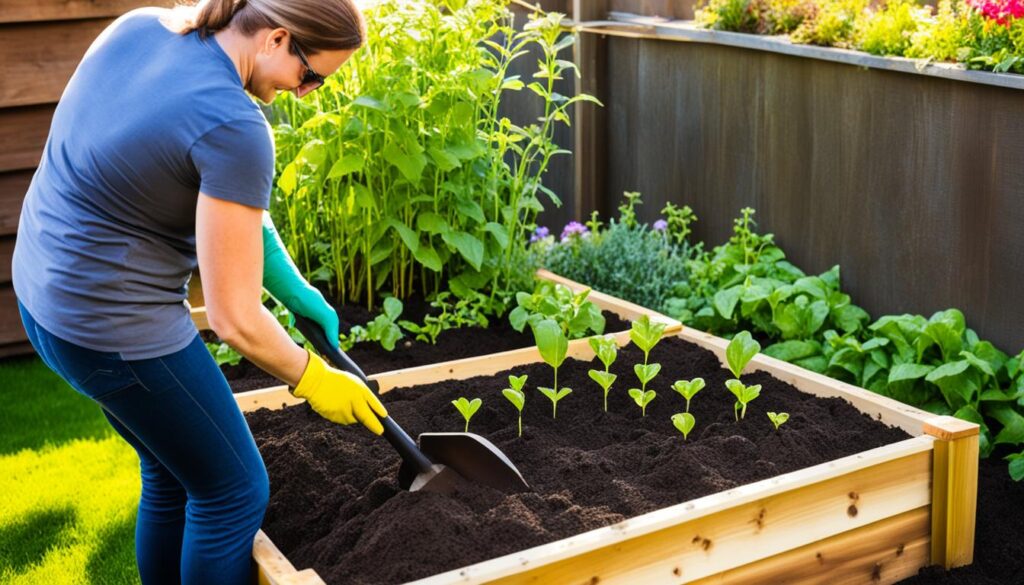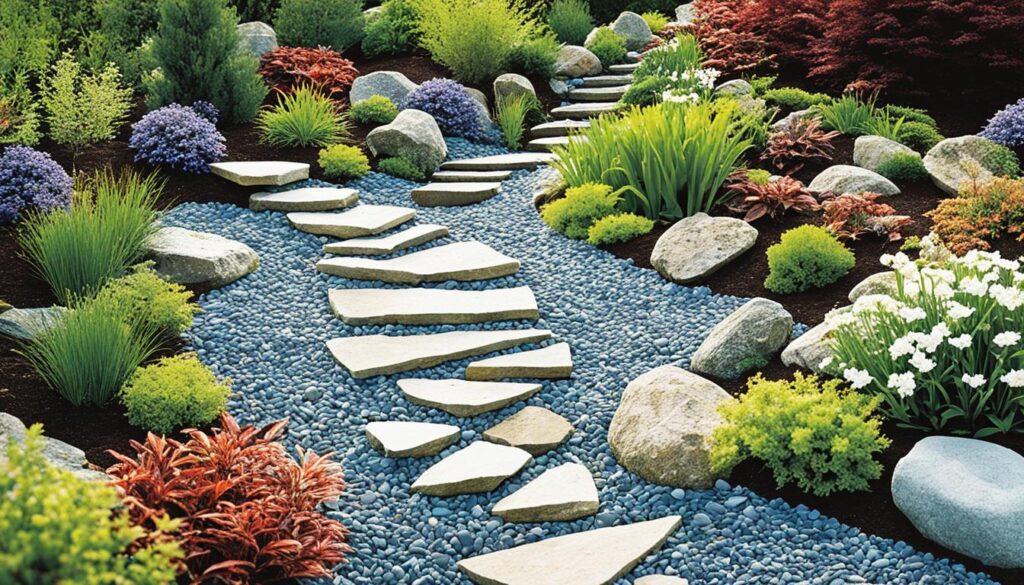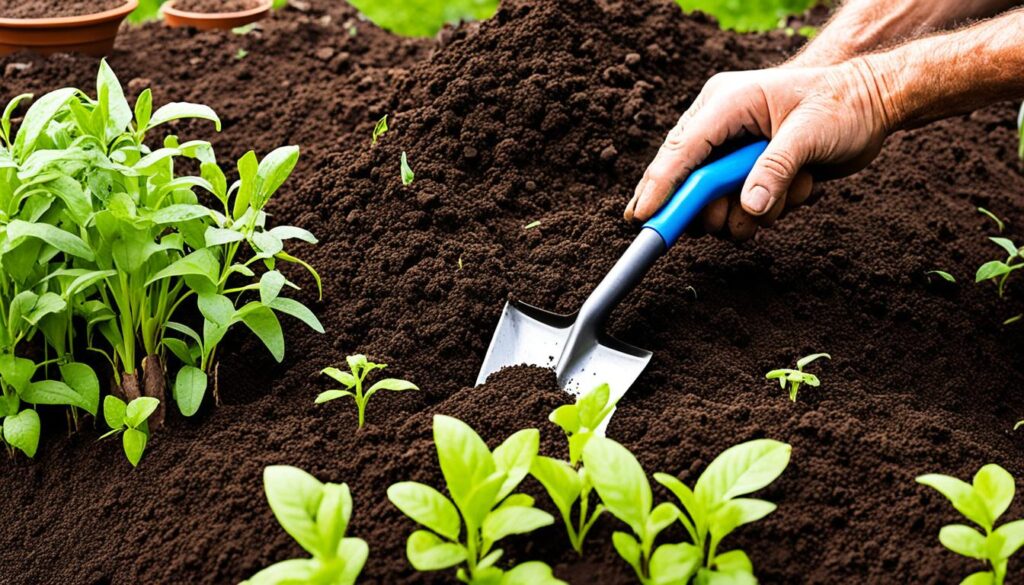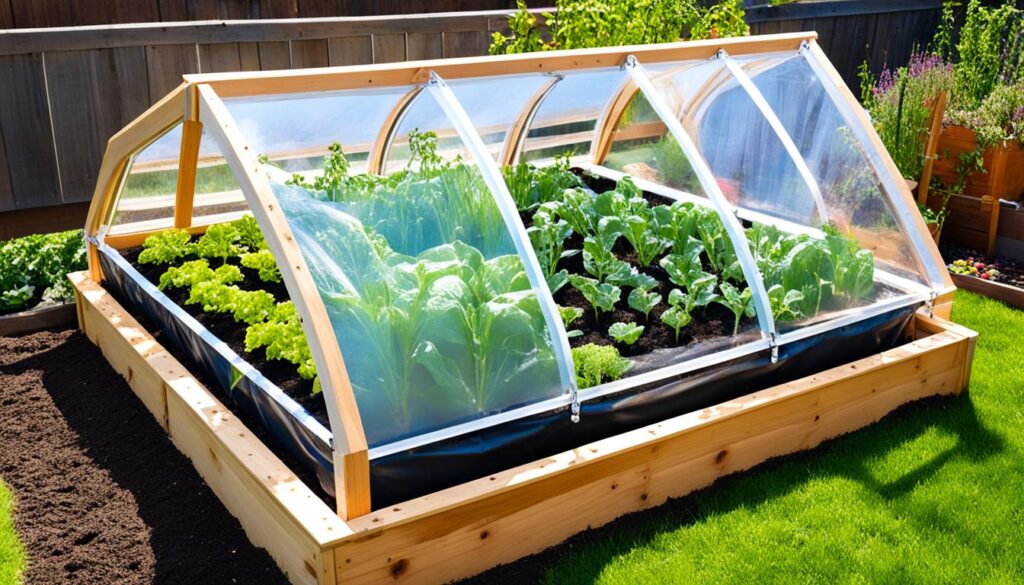Gardening enthusiasts are always looking for innovative ways to improve their garden’s health and productivity. One unconventional yet surprisingly effective method is using plastic forks in the garden. Yes, you read that right! Plastic forks can offer various benefits for your garden and help you achieve lush, thriving foliage. In this article, I will explore why putting plastic forks in your garden is a game-changer and how they can contribute to your plants’ overall well-being.
Key Takeaways:
- Plastic forks can enhance soil aeration, allowing roots to receive more oxygen.
- They act as a protective barrier, safeguarding your greenery from pests and unwanted visitors.
- Plastic forks stimulate plant growth by preventing root compaction.
- They can be repurposed creatively for various gardening tasks.
- Consider sustainable practices for repurposing plastic forks to reduce environmental impact.
With their versatility and practicality, plastic forks offer more than just a handy utensil. Let’s dive into the details and discover how these everyday items can revolutionize your gardening experience.
Enhancing Soil Aeration with Plastic Forks
In my gardening experience, I have discovered a clever trick to improve soil aeration using plastic forks. It may sound unconventional, but trust me, it works wonders for your plants. By strategically placing plastic forks in your garden, you can enhance the flow of oxygen to the roots and promote healthier growth.
So, how exactly do plastic forks contribute to better soil aeration? The answer lies in their design and functionality. The tines of a plastic fork create small channels when inserted into the soil. These channels allow air to circulate more freely and reach the root zone, providing the necessary oxygen that plants need for respiration.
Furthermore, plastic forks can act as a protective barrier against external elements that may compact the soil. When used in areas prone to foot traffic or heavy machinery, the forks help distribute the weight more evenly, preventing soil compaction and ensuring better aeration. This is particularly beneficial for plants that have shallow roots.
If you’re concerned about the potential damage that foot traffic or garden pests can cause to your plants, plastic forks can serve as a simple yet effective solution. By strategically positioning them around vulnerable plants, you create a deterrent for pests and unwanted visitors, such as small animals. This natural defense mechanism helps safeguard your greenery while promoting healthy growth.
Using plastic forks for soil aeration and plant protection is a cost-effective and eco-friendly approach. It eliminates the need for harsh chemicals or expensive alternatives, making it accessible to gardeners of all experience levels. Whether you’re an avid gardener or just starting out, this technique can significantly improve the overall health and vitality of your plants.
In the next section, we will explore further ways you can utilize plastic forks to provide protection for your greenery and enhance plant growth.
Protecting Your Greenery with Plastic Forks
When it comes to ensuring the health and safety of your plants, plastic forks can be an unexpected and highly effective solution. These humble utensils can serve as a protective barrier, safeguarding your greenery from pests, weeds, and even curious pets. Let’s explore the various ways in which plastic forks can be used to shield your precious plants and promote their healthy growth.
Maintaining a Safe Distance
Plastic forks can act as a physical deterrent, creating a safe distance between your plants and potential threats. By inserting the forks in the ground around your garden beds or individual plants, you can create a barrier that discourages pests, such as slugs and snails, from reaching your vegetation. The pointed tines of the forks pose an obstacle for these unwanted visitors, effectively protecting your greenery from damage.
Additionally, plastic forks can act as a barrier against crawling insects or pests that may cause harm to your plants. The fork tines act as a deterrent, preventing these pests from accessing your plants and causing damage to delicate leaves, flowers, or fruits.
Warding off Weeds
Plastic forks can also serve as a natural weed barrier, preventing unwanted growth and competition for nutrients in your garden. By strategically placing them in the soil, with the tines facing upwards, you create an obstacle that inhibits the growth and spread of weeds. This method is particularly effective for preventing weeds from encroaching on your delicate plants, allowing them to thrive without unnecessary competition.
A Safer Environment for your Greenery
Plastic forks can help create a safer environment for your plants, especially if you have pets or other animals that roam freely in your garden. By placing plastic forks around your plants, you can deter curious pets from digging or trampling on your greenery. The fork tines act as a reminder to pets that the area is off-limits, protecting your plants from accidental damage while still allowing them to enjoy the freedom of your outdoor space.
Using plastic forks as a protective measure not only helps safeguard your plants but also promotes their healthy growth. With the added peace of mind that your plants are protected, you can cultivate your garden with confidence and watch your greenery flourish.

Promoting Plant Growth with Plastic Forks
Plastic forks have proven to be effective tools in promoting plant growth in gardens. Their unique design allows them to penetrate the soil easily, providing numerous benefits for your plants.
One key advantage of using plastic forks for garden growth is their ability to prevent root compaction. When the soil becomes compacted, it restricts the movement of air, water, and essential nutrients to the plant roots. This can hinder growth and lead to poor plant health. However, by inserting plastic forks into the soil, you create channels that help prevent compaction, allowing the roots to receive the necessary resources for optimal growth.
Another benefit of plastic forks in promoting plant growth is their ability to stimulate aeration within the soil. A well-aerated soil creates a hospitable environment for the roots, allowing them to access oxygen easily. This oxygen facilitates vital processes such as nutrient uptake and root respiration, which are crucial for plant growth and development.
When using plastic forks to promote plant growth, it is important to consider the placement and spacing of the forks. Ensure that the forks are inserted deep enough to reach the root zone but not too close to the plants, as this could damage the delicate roots.
In addition to their direct impact on plant growth, plastic forks also offer other garden benefits. They can act as physical barriers, deterring pests and animals from damaging your plants. Their presence can deter small critters and pets from trampling over or digging in your garden beds.
With the right placement and utilization, plastic forks can significantly enhance the growth of your garden plants. Harness their potential by incorporating them strategically into your garden and observing the positive effects on plant growth and overall plant health.
Creative Uses for Plastic Forks in the Garden
Plastic forks are more versatile than you might think, and they can be repurposed in creative ways to enhance your gardening experience. Here are some innovative ideas on how to use plastic forks in unique ways for various gardening tasks.
Garden Tool Hangers
Plastic forks can be transformed into handy garden tool hangers. Simply attach them vertically to a wooden board or the side of a shed using screws or strong adhesive. Hang your smaller gardening tools, such as trowels, pruners, and hand forks, between the fork tines for easy access and organization.
Plant Labels
Instead of buying expensive plant labels, why not repurpose plastic forks? Use a permanent marker or paint to write the names of your plants on the handles of the forks. Stick the fork tines carefully into the soil next to each plant, creating a unique and budget-friendly way to label your garden.
Deter Garden Pests
Plastic forks can act as a deterrent for garden pests. Insert the forks into the ground around the perimeter of your garden beds, with the fork tines facing up. This can help deter small animals, such as rabbits, squirrels, and cats, from digging in your garden and disturbing your plants.
Scaffold for Climbing Plants
Create a makeshift scaffold for climbing plants using plastic forks. Push the tines of the forks into the ground around the base of the plant, forming a circle or semi-circle shape. As the plant grows, gently weave its tendrils through the fork tines, providing support and promoting vertical growth.

These are just a few examples of the creative uses for plastic forks in the garden. Get inventive and explore how you can repurpose plastic forks to suit your gardening needs. Not only will you save money and reduce waste, but you’ll also add a touch of creativity to your outdoor space.
The Environmental Impact of Using Plastic Forks in the Garden
While plastic forks offer numerous benefits in the garden, it is crucial to consider their environmental impact. As gardeners, we have a responsibility to adopt sustainable practices and minimize our carbon footprint. One way to do this is by repurposing plastic forks in the garden, giving them a second life and reducing waste.
By repurposing plastic forks, we can divert them from landfills and extend their usefulness. There are several creative and eco-friendly ways to incorporate plastic forks into our gardening routines. Let’s explore some sustainable practices for repurposing plastic forks in the garden:
1. Mulch Stakes:
Placing plastic forks upright in the soil can act as a deterrent for pests, while also serving as mulch stakes to support the growth of your plants. The prongs of the forks create a barrier for slugs and other critters, helping to protect your garden naturally.
2. Seedling Markers:
Reuse plastic forks as markers to identify different types of seedlings in your garden. Simply write the names of the plants on the handle or attach small labels to them. This repurposing idea not only helps you keep track of your plants but also reduces the need for single-use plastic labels.
3. Watering Can Spout:
If you’re in need of a makeshift watering can, repurpose a plastic fork by creating small holes on the back of a plastic bottle cap. Insert the handle of the fork into the cap, and you have an improvised watering can spout. This DIY solution allows for controlled watering and helps minimize water waste.
4. Plant Propagation:
Plastic forks can be useful tools for plant propagation. You can gently insert the prongs of the fork into the soil to create small holes for placing plant cuttings. The forks provide stability and support for the cuttings as they root, aiding in successful propagation.
5. Sculptural Garden Decor:
Embrace your creative side by using plastic forks to create unique garden sculptures. Bend the prongs of the forks into different shapes and arrange them to form whimsical structures or decorative borders in your garden. This fun and sustainable DIY project add a touch of personality to your outdoor space.
By repurposing plastic forks in these ways, you can reduce their environmental impact and contribute to a more sustainable gardening practice. Let’s be mindful of the materials we use in our gardens and seek innovative ways to repurpose and recycle to create a greener, healthier environment for our plants and ourselves.
Tips for Using Plastic Forks in the Garden
When it comes to gardening with plastic forks, it’s important to know how to use them effectively as garden tools. Here are some valuable tips and techniques to help you make the most out of your plastic forks in the garden:
- Choose sturdy plastic forks: Look for plastic forks that are made of durable materials, ensuring they can withstand the rigors of gardening tasks.
- Gardening with plastic forks: Plastic forks can be used for various gardening tasks, such as loosening soil, transplanting seedlings, and even weeding. The forked tines can gently break up compacted soil, providing better aeration for the roots.
- Avoid excessive force: Use plastic forks with a gentle hand, especially when working near delicate plants. Apply just enough pressure to penetrate the soil without causing damage.
- Proper grip: Hold the plastic fork firmly and use your other hand to stabilize the tool, allowing for better control and accuracy during tasks.
- Easy clean-up: Plastic forks can be easily cleaned after use. Simply rinse them with water and mild soap, and they will be ready for their next gardening session.
- Store properly: To ensure the longevity of your plastic forks, store them in a dry place to prevent any moisture or rust accumulation. This will help maintain their efficiency for future use.
By following these tips and techniques, you can harness the benefits of plastic forks as garden tools. Their versatility and ease of use make them a valuable addition to any gardener’s arsenal. So why not give it a try and see the difference plastic forks can make in your garden?
Choosing the Right Plastic Forks for Your Garden
When it comes to gardening, not all plastic forks are created equal. To ensure the best results for your garden, it’s important to consider the key factors when choosing the right plastic forks. These factors can greatly impact their performance and the benefits they provide to your garden.
1. Durability: Look for plastic forks that are sturdy and durable. They should be able to withstand the rigors of outdoor use, including exposure to the elements and regular handling. Opt for forks made from high-quality materials that are resistant to breaking or bending.
2. Length and Tine Spacing: Consider the length and tine spacing of the plastic forks. Longer forks are ideal for reaching deeper into the soil, while forks with wider tine spacing allow for better aeration and drainage. Evaluate your gardening needs and choose forks that align with your specific requirements.
3. Fork Design: Different fork designs can offer unique benefits. Look for forks with sharp tines that can easily penetrate the soil, promoting aeration and preventing root compaction. Forks with curved tines can be especially effective for lifting and turning the soil, aiding in plant growth.
4. Ergonomic Handles: Comfort is important when working in the garden for extended periods. Choose plastic forks with ergonomic handles that provide a comfortable grip. This will reduce hand fatigue and allow for better control during use.
5. Eco-Friendly Options: Consider eco-friendly options when selecting plastic forks for your garden. Look for forks made from recycled materials or those that are biodegradable. This way, you can enjoy the benefits of plastic forks while minimizing their impact on the environment.
By carefully evaluating these factors and considering the specific needs of your garden, you can choose the right plastic forks that will enhance your gardening experience. Whether you’re using them for plant protection or to promote garden growth, selecting the appropriate forks can make a significant difference in the overall success of your gardening endeavors.
Maintaining and Cleaning Plastic Forks
Proper maintenance and cleaning are crucial for ensuring the longevity of plastic forks and minimizing the risk of contamination in your garden. By following a few simple steps, you can keep your plastic forks in good condition and ready for continued use.
Cleaning Plastic Forks
To clean your plastic forks, start by rinsing them under running water to remove any visible dirt or debris. Next, fill a basin or sink with warm water and a mild dish soap. Submerge the forks in the soapy water and use a sponge or dishcloth to gently scrub away any remaining dirt.
After cleaning, rinse the forks thoroughly to remove any soap residue. It’s important to ensure that no soap is left on the utensils as it can contaminate your garden soil and potentially harm your plants.
Drying Plastic Forks
Once your plastic forks are clean, it’s important to dry them properly to prevent the growth of bacteria or mold. You can either leave them to air dry in a well-ventilated area or use a clean towel to wipe them dry.
Ensure that the forks are completely dry before storing them to avoid any moisture buildup that could lead to bacterial growth or rusting. If you plan to store the forks for an extended period, consider using a dry, airtight container to protect them from dust and moisture.
Maintaining Plastic Forks
In addition to regular cleaning, there are a few maintenance tips that can help prolong the lifespan of your plastic forks. Avoid using harsh chemicals or abrasive materials when cleaning, as they can scratch or damage the forks.
If you notice any signs of wear or damage, such as cracking or bending, it’s best to replace the forks to ensure they remain effective in your garden. Regularly inspect the forks for any signs of deterioration and replace them as needed.
Remember, repurposing plastic forks in your garden is a sustainable and resourceful practice, but proper maintenance and cleaning are essential to keep them in good condition. By following these simple guidelines, you can enjoy the benefits of repurposing plastic forks while maintaining a healthy and thriving garden.

Other Types of Cutlery as Alternatives to Plastic Forks
When it comes to using cutlery in the garden, plastic forks aren’t the only option available. There are several alternative types of cutlery that can be repurposed for similar purposes, offering their own unique benefits and drawbacks.
Metal Spoons
If you’re looking for a sturdy and durable option, metal spoons can be a great alternative to plastic forks in the garden. Their robust construction allows them to withstand the elements and provide stability for your plants. Metal spoons are excellent for creating small plant markers, as their curved shape naturally accommodates handwritten labels.
Wooden Knives
Wooden knives have a rustic charm and can be repurposed in your garden for various tasks. They are an ideal choice for delicately transplanting seedlings or dividing small plants, ensuring minimal damage to delicate roots. Additionally, the biodegradable nature of wooden knives makes them an eco-friendly alternative to plastic forks.
Bamboo Skewers
Bamboo skewers are versatile garden tools that can be easily repurposed from their original kitchen use. These slender and pointed sticks can be used to stake and support plants, especially those with delicate stems that require gentle guidance. They offer a natural aesthetic and blend well with greenery, providing subtle support without detracting from the garden’s visual appeal.
Remember, when repurposing cutlery for garden use, it’s important to consider the specific requirements of your plants and the tasks you need to accomplish. Each type of alternative cutlery has its own unique characteristics and suitability for different gardening scenarios.
DIY Projects with Plastic Forks for Garden Decor
Looking to add a touch of creativity and charm to your garden? Why not consider incorporating plastic forks into your DIY garden decor projects? These versatile and readily available utensils can be transformed into unique and eye-catching elements that will surely impress your visitors. Here are a few creative uses for plastic forks in the garden:
1. Fork Plant Markers
Turn plain plastic forks into stylish plant markers by attaching labels or small tags to the tines. Use a permanent marker to write the names of your plants or use decorative stickers for a more personalized touch. Insert the fork markers into the soil near each plant, and you’ll have an attractive and functional way of identifying your garden’s botanical treasures.
2. Fork Wind Chimes
Create a delightful musical display in your garden with a homemade plastic fork wind chime. Simply tie several forks to a metal hoop or piece of driftwood using durable string or fishing line. Hang the wind chime in a breezy spot, and let the tinkling sound of the forks bring a soothing ambiance to your outdoor sanctuary.
3. Fork Flower Pot Holder
Elevate your potted plants by repurposing plastic forks as flower pot holders. Attach plastic forks to a wooden board or piece of pallet wood using strong glue or screws, making sure to position them with the tines facing upwards. Insert your flower pots into the fork tines, creating an interesting and visually appealing display of greenery.
4. Fork Garden Border
Add a touch of whimsy to your garden beds by using plastic forks as a decorative border. Simply insert the tines of the forks into the ground, positioning them closely together to form a neat and distinctive edge. This DIY garden border not only adds a fun element to your outdoor space but also helps keep grass and weeds from encroaching into your flower beds.
5. Fork Butterfly Feeder
Create a miniature butterfly haven by repurposing plastic forks into feeding stations. Attach brightly-colored artificial flowers or sponges soaked in a sugar-water solution to the tines of the forks. Hang the forks in a sunny area of your garden, and watch as the vibrant blooms attract and nourish butterflies, bringing a fluttering spectacle to your backyard.
These creative uses for plastic forks in the garden are just the tip of the iceberg. With a little imagination and DIY spirit, you can repurpose this everyday item into countless other garden decor pieces. So, let your creativity blossom and start transforming your outdoor space with plastic forks today!
Conclusion
In conclusion, using plastic forks in your garden can bring about a multitude of benefits. Not only do they enhance soil aeration, but they also provide protection for your precious greenery and promote healthy plant growth.
By repurposing plastic forks creatively, you can enhance their functionality and make the most out of these versatile tools in your gardening endeavors.
It is important, however, to be mindful of the environmental impact of plastic forks. Consider sustainable practices like repurposing them to reduce their overall footprint and contribute to a greener planet.
So why put plastic forks in your garden? The answer lies in their ability to improve soil aeration, protect your plants, and foster their growth. With some creativity and a nod towards sustainability, plastic forks can be valuable allies in your gardening journey.








